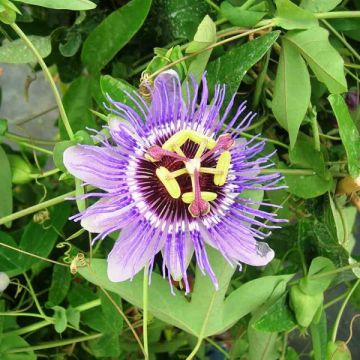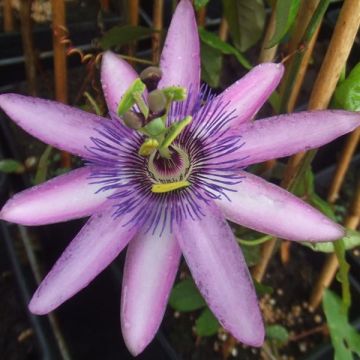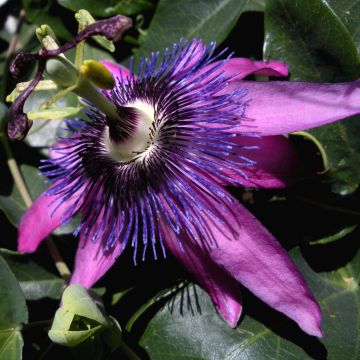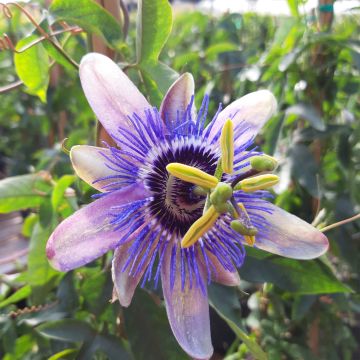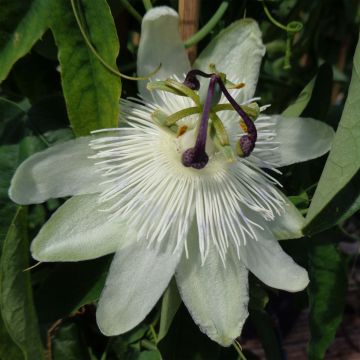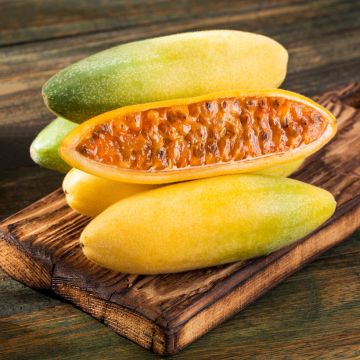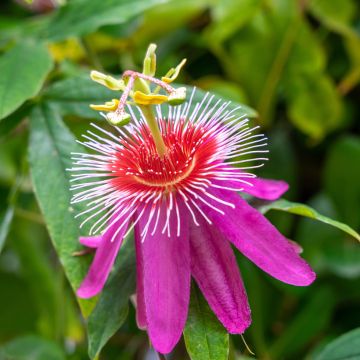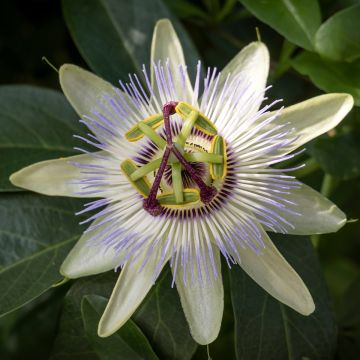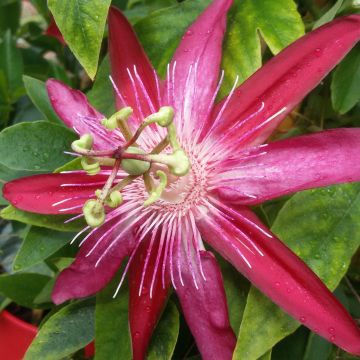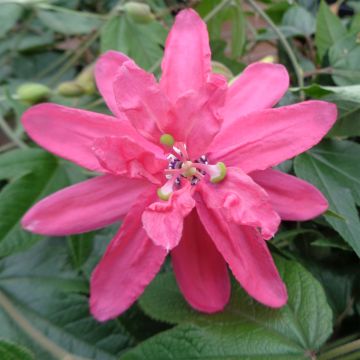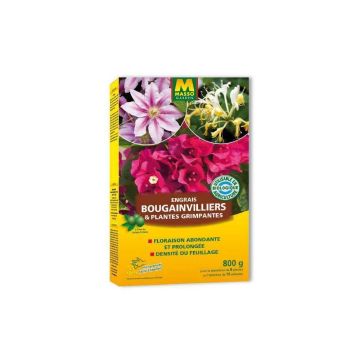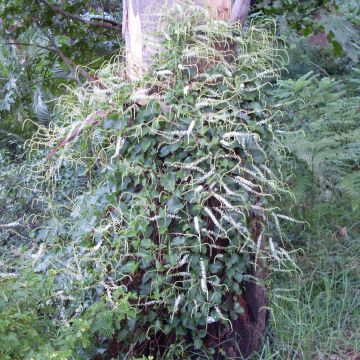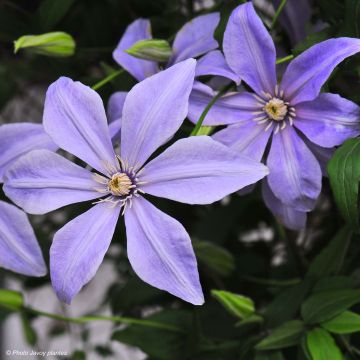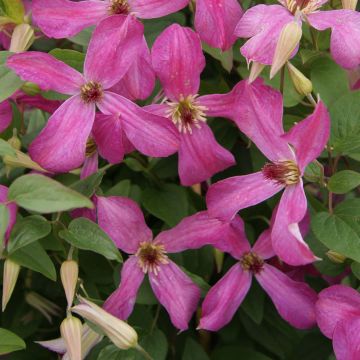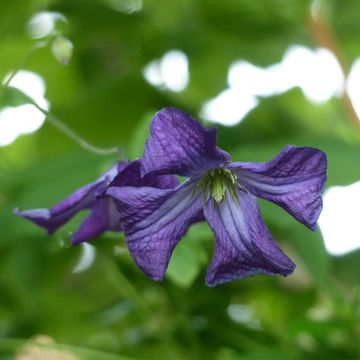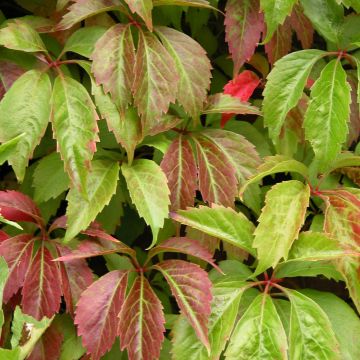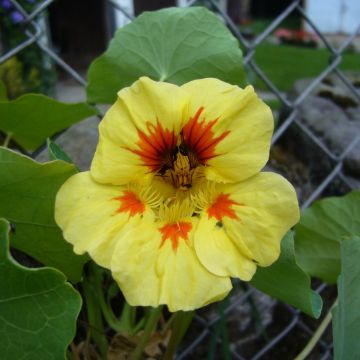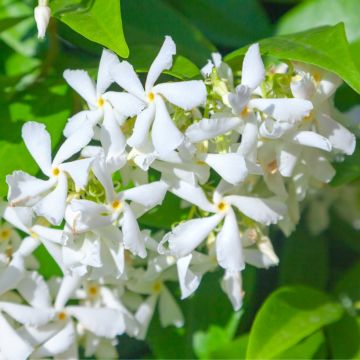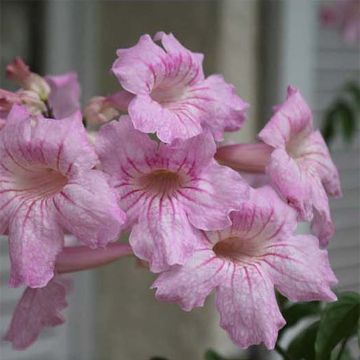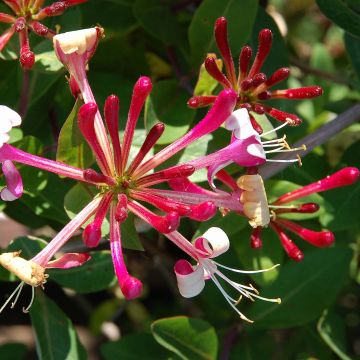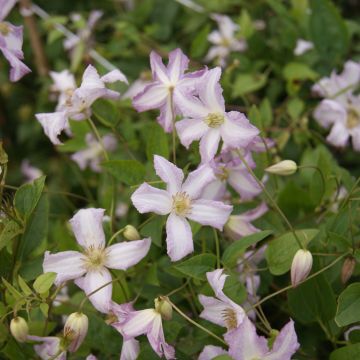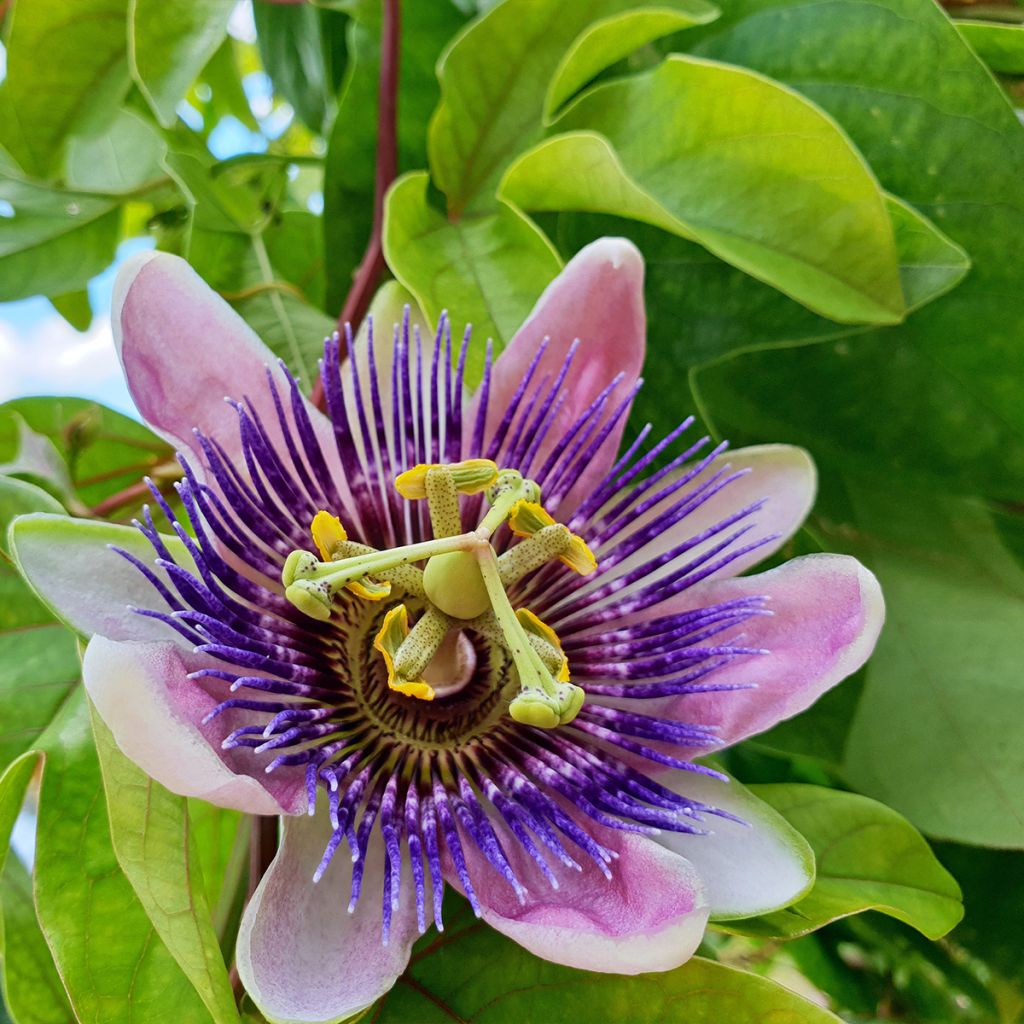

Passiflora Eugenie- Passion Flower
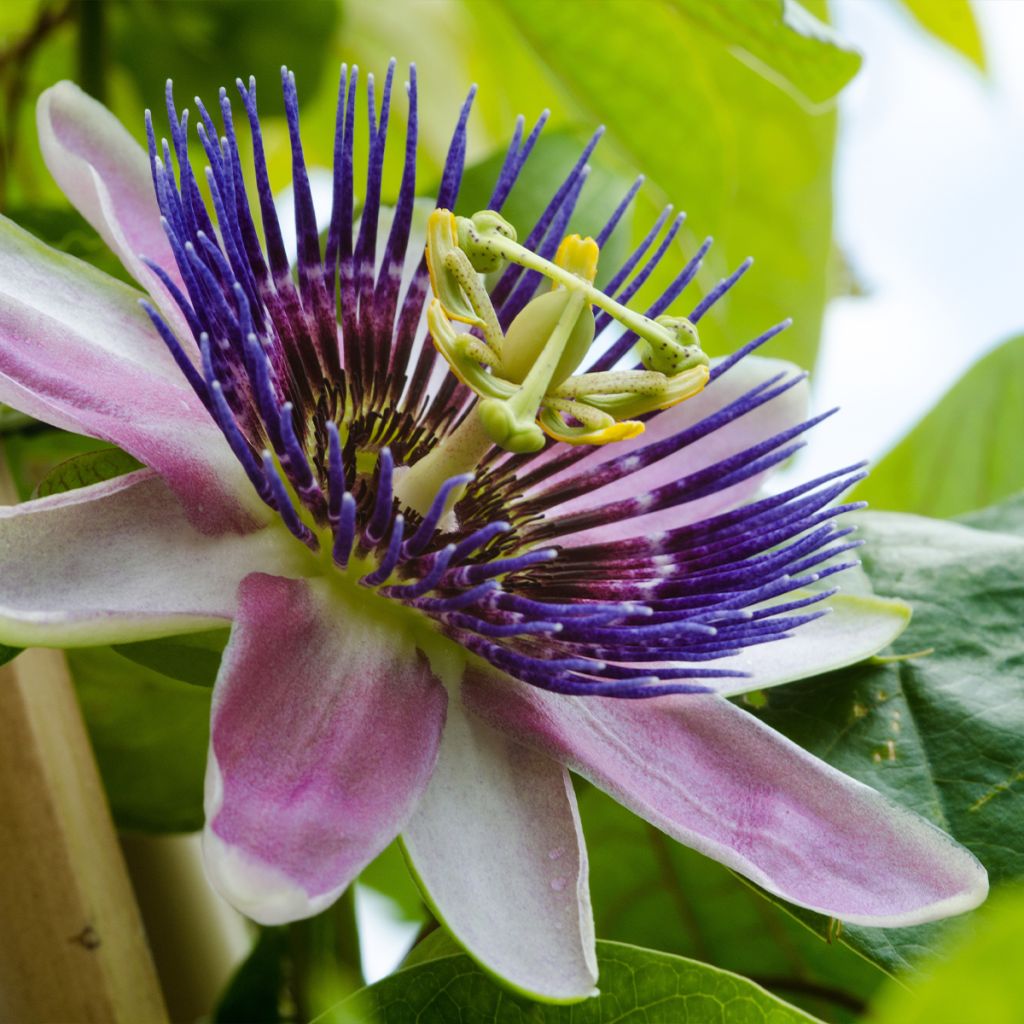

Passiflora Eugenie- Passion Flower
Passiflora Eugenie- Passion Flower
Passiflora x belotii Imperatrice Eugénie
Passionflower, Passion fruit, Grenadilla
Why not try an alternative variety in stock?
View all →This plant carries a 6 months recovery warranty
More information
We guarantee the quality of our plants for a full growing cycle, and will replace at our expense any plant that fails to recover under normal climatic and planting conditions.
From €5.90 for pickup delivery and €6.90 for home delivery
Express home delivery from €8.90.
Does this plant fit my garden?
Set up your Plantfit profile →
Description
The Passiflora x belotii 'Empress Eugenie' is a climbing plant resulting from cross-breeding between two other species. Vigorous, it can reach a height of 4 to 5m (13 to 16ft) on a trellis that it will quickly cover. This variety has trilobed leaves, deciduous or semi-evergreen in very mild climates. It is especially remarkable for its magnificent flowering, combining white, pink, mauve, and violet tones. Not very hardy, this passionflower can only be grown in open ground in our mildest winter regions, where temperatures rarely and briefly drop to -5°C. Elsewhere, it will make a beautiful greenhouse or conservatory plant.
Mostly native to tropical areas of South America, Passifloras belong to the Passifloraceae family, the most well-known genus. This genus comprises more than 500 species and numerous spontaneous or horticultural hybrids. They are mostly tropical plants, but some species are also subtropical and can survive winter in the mildest regions of France, primarily along the Mediterranean or oceanic coastlines in sheltered areas. Passiflora x belotii is a hybrid obtained by crossing the blue passionflower (Passiflora coerulea), one of the hardiest species capable of withstanding temperatures as low as -12°C, with the Passiflora alata, a climbing evergreen with beautiful red flowers native to the Amazon.
The 'Empress Eugenie' passionflower produces flowers with shades that are intermediate between those of its two parents. Thus, the first crown of 5 sepals is cream white, while the second, also made up of 5 petals similar to the sepals, is a slightly mauve pink. A third crown of numerous, slender, and graceful ornamental filaments is adorned with a beautiful violet mauve hue. The 5 bright yellow stamens open in a star shape at the base of the pistil and are divided into 3 yellow-green stigmas. This highly sophisticated floral ensemble contributes to the fascination exerted by this plant, which has been associated with the passion of Christ for several centuries, each floral element being credited with a specific meaning. In 'Empress Eugenie', named in honour of Napoleon III's wife, the flowers are quite large, reaching 10 to 12 cm (4 to 5in) in diameter. They are well highlighted by the trilobed leaves, 10 to 15 cm (4 to 6in) wide, of medium green colour and good coverage. These leaves remain evergreen in winter if the plant is kept frost-free. The 'Empress Eugenie' passionflower is a climbing plant that clings to its support with tendrils. Grown in a container, it will remain compact and can be pruned to limit growth.
This Empress Eugenie Passionflower thrives in very mild climates in winter, not too hot and not too dry in summer. With its height of 4-5m (13-16ft), this climber can be used to decorate walls, fences, grills, porches, and trellises. Elsewhere, it will be appreciated in an unheated greenhouse or conservatory where it can spend the winter. To create a tropical scene in a mild climate, plant it alongside other exotic-looking plants, such as Caesalpinia gilliesii, with flowers resembling the tropical Flamboyant. Slightly less hardy, Sesbania punicea and its striking red flowers also have a fiercely exotic appearance.
Report an error about the product description
Passiflora Eugenie- Passion Flower in pictures
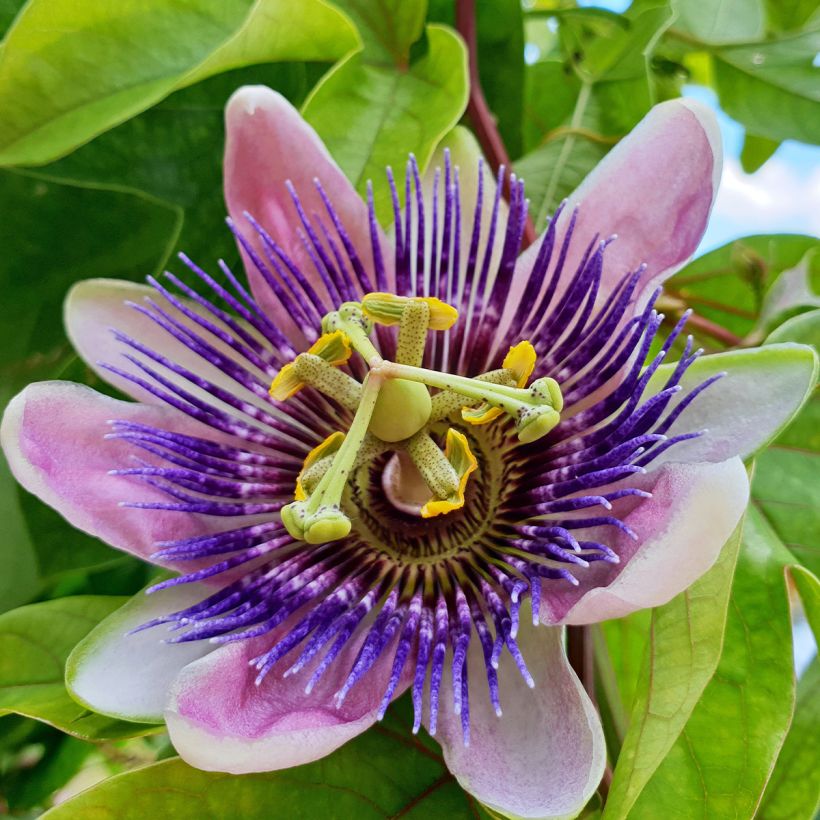

Plant habit
Flowering
Foliage
Botanical data
Passiflora
x belotii
Imperatrice Eugénie
Passifloraceae
Passionflower, Passion fruit, Grenadilla
Cultivar or hybrid
Other Passionflowers
Planting and care
The 'Empress Eugenie' Passion Flower is a sun-loving or semi-shade plant, suitable for outdoor cultivation only in our mildest winter regions: its stump, well protected by a thick mulch, will only withstand short frosts of around -5°C (23°F). It should be grown in a large pot, allowing winter shelter everywhere else. This passion flower also dreads heatwaves in the summer. Plant it in a bright but not scorching location, in ordinary, well-drained soil that remains slightly moist but not waterlogged throughout the growing season. Place it on a support to support the weight of the vegetation. Guide its branches well onto the support, as the growth is exuberant. Pruning before winter is recommended to maintain a reasonable size. Don't hesitate to cut back the main branches to facilitate growth. Remove dead or misplaced branches and prune excess branches to aerate the plant. Beware of scale insects, whiteflies, and the cucumber mosaic virus. Treat preventively.
Planting period
Intended location
Care
This item has not been reviewed yet - be the first to leave a review about it.
Summer flowering climbers
Haven't found what you were looking for?
Hardiness is the lowest winter temperature a plant can endure without suffering serious damage or even dying. However, hardiness is affected by location (a sheltered area, such as a patio), protection (winter cover) and soil type (hardiness is improved by well-drained soil).

Photo Sharing Terms & Conditions
In order to encourage gardeners to interact and share their experiences, Promesse de fleurs offers various media enabling content to be uploaded onto its Site - in particular via the ‘Photo sharing’ module.
The User agrees to refrain from:
- Posting any content that is illegal, prejudicial, insulting, racist, inciteful to hatred, revisionist, contrary to public decency, that infringes on privacy or on the privacy rights of third parties, in particular the publicity rights of persons and goods, intellectual property rights, or the right to privacy.
- Submitting content on behalf of a third party;
- Impersonate the identity of a third party and/or publish any personal information about a third party;
In general, the User undertakes to refrain from any unethical behaviour.
All Content (in particular text, comments, files, images, photos, videos, creative works, etc.), which may be subject to property or intellectual property rights, image or other private rights, shall remain the property of the User, subject to the limited rights granted by the terms of the licence granted by Promesse de fleurs as stated below. Users are at liberty to publish or not to publish such Content on the Site, notably via the ‘Photo Sharing’ facility, and accept that this Content shall be made public and freely accessible, notably on the Internet.
Users further acknowledge, undertake to have ,and guarantee that they hold all necessary rights and permissions to publish such material on the Site, in particular with regard to the legislation in force pertaining to any privacy, property, intellectual property, image, or contractual rights, or rights of any other nature. By publishing such Content on the Site, Users acknowledge accepting full liability as publishers of the Content within the meaning of the law, and grant Promesse de fleurs, free of charge, an inclusive, worldwide licence for the said Content for the entire duration of its publication, including all reproduction, representation, up/downloading, displaying, performing, transmission, and storage rights.
Users also grant permission for their name to be linked to the Content and accept that this link may not always be made available.
By engaging in posting material, Users consent to their Content becoming automatically accessible on the Internet, in particular on other sites and/or blogs and/or web pages of the Promesse de fleurs site, including in particular social pages and the Promesse de fleurs catalogue.
Users may secure the removal of entrusted content free of charge by issuing a simple request via our contact form.
The flowering period indicated on our website applies to countries and regions located in USDA zone 8 (France, the United Kingdom, Ireland, the Netherlands, etc.)
It will vary according to where you live:
- In zones 9 to 10 (Italy, Spain, Greece, etc.), flowering will occur about 2 to 4 weeks earlier.
- In zones 6 to 7 (Germany, Poland, Slovenia, and lower mountainous regions), flowering will be delayed by 2 to 3 weeks.
- In zone 5 (Central Europe, Scandinavia), blooming will be delayed by 3 to 5 weeks.
In temperate climates, pruning of spring-flowering shrubs (forsythia, spireas, etc.) should be done just after flowering.
Pruning of summer-flowering shrubs (Indian Lilac, Perovskia, etc.) can be done in winter or spring.
In cold regions as well as with frost-sensitive plants, avoid pruning too early when severe frosts may still occur.
The planting period indicated on our website applies to countries and regions located in USDA zone 8 (France, United Kingdom, Ireland, Netherlands).
It will vary according to where you live:
- In Mediterranean zones (Marseille, Madrid, Milan, etc.), autumn and winter are the best planting periods.
- In continental zones (Strasbourg, Munich, Vienna, etc.), delay planting by 2 to 3 weeks in spring and bring it forward by 2 to 4 weeks in autumn.
- In mountainous regions (the Alps, Pyrenees, Carpathians, etc.), it is best to plant in late spring (May-June) or late summer (August-September).
The harvesting period indicated on our website applies to countries and regions in USDA zone 8 (France, England, Ireland, the Netherlands).
In colder areas (Scandinavia, Poland, Austria...) fruit and vegetable harvests are likely to be delayed by 3-4 weeks.
In warmer areas (Italy, Spain, Greece, etc.), harvesting will probably take place earlier, depending on weather conditions.
The sowing periods indicated on our website apply to countries and regions within USDA Zone 8 (France, UK, Ireland, Netherlands).
In colder areas (Scandinavia, Poland, Austria...), delay any outdoor sowing by 3-4 weeks, or sow under glass.
In warmer climes (Italy, Spain, Greece, etc.), bring outdoor sowing forward by a few weeks.

































